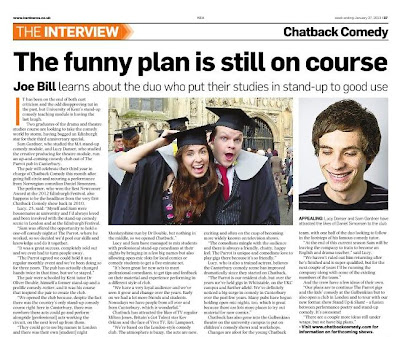At the end of last year you may remember that I wrote a review* of a night at Polari, Paul Burston's Gay Literary Salon at the Royal Festival Hall on London's Southbank. It's essentially a platform for LGBT authors or works to be read for a friendly and interested audience. At the first Polari I attended this was the basic set up but I noticed that the couple I went to more recently have had a great performance aspect to them with cabaret artistes and singers nestled in amongst the authors. I don't know whether these were anomalies or whether this is the way most nights are conducted. Either way it's a great place for audience members to watch a wide range of performances encapsulating poetry, music, novels, plays and more. Plus it's great for everyone that the opportunity to discuss the works and to offer feedback is there also. Last time my article was from the point of view of an audience member. This month Paul kindly gave me the opportunity to perform from my own writing so I've now experienced Polari from another perspective which I'd like to share here!
I haven't performed, properly, in a blooming long time. Way too long. Acting was always kinda 'my thing' but in doing the whole getting-out-there-and-making-things-happen-for-myself shebang I veered off course and created projects entirely unsuitable for me to perform at - a comedy club (me!? please, don't make me laugh...excuse the PUN...See!? This is exactly what I mean), a play about a sixty year old woman stuck on the loo (don't even say it) and a play about a fifty year old, 6'2" pre-op transgender lady (...). So it's fair to say that I was terrified. I wanted to do it, because I knew I could, but my head kept filling with memories of jokes falling flat and unsuccessful auditions turning me into a quivering wreck. Although it was sort of the good kind of fear. You know the kind that happens before you do something you know you're probably going to be quite proud of? So the knowledge of that future is already present, mingling with and sweetening the panic. But obviously you're still scared. Taking one look at me Paul commented wryly, "You're nervous? Yes, because we all know what a horrible, judgemental bunch the Polari audiences are!" and suddenly everything was almost okay.
I loved performing at Polari. As I got up on stage I looked down upon the audience and saw smiling faces looking expectantly but kindly towards me. No one was checking their watch or gazing over at the bar. They were all giving me a chance. There's something about that atmosphere that buoys you up. That's why it's important that people learn the conventions of theatregoing, that comperes know how to create a mood, that shows are correctly and honestly marketed and why drunken comedy nights are always a pain. The joy of live theatre is the same as its downfall. It relies on the interaction between an audience and a performer. Not necessarily anything they say or do to one another but the energy that they offer towards and receive from each other. People come to Polari because they want to hear these works, to find a new author they love or to find out what their favourites are up to. They come because they want all that and they want it in an interactive, warm and theatrical setting.
I read from Rachael's Cafe** which hasn't been performed since last year and by a male actor at that. To have the opportunity to present the work in a different way and to hear what people made not of an entire production but of just the words themselves was enjoyable and also very helpful. The whole event taught me a great deal about reading one's own work, public speaking, preparation and about sharing small amounts of a piece rather than the full play. A highlight for me was meeting actor Bette Bourne whose performance in Resident Alien in Edinburgh a few years ago was absolutely unforgettable.
So! Moving on from me, me, me! It took me a while to calm down back into audience mode but, once I did, I was rewarded with an array of different performances. Will Davis read his short story about a superhero coming out (which left the audience crying with laughter), Karen Mcleod performed two tales from her blog (one hilarious, one sad but beautifully written) and MrMistress performed her burlesque routine 'The Gay Messiah' (special note must go to what must have been the time consuming and delicate task of exchanging high heels for plastic penises). Let's not forget Barbara Brownskirt who stormed the stage to perform her hilarious poetry. Finally the lovely Steven Appleby took us through a little talk on his career as a cartoonist and finished his performance by turning the audiences' secrets into cartoons live on stage.
What was particularly nice for me this time around was that, as well as performing, I got to meet everyone involved and to talk to them about what they were up to. It was great to hear what everyone else was working on rather than just seeing them through the one piece they were performing that day. As usual Paul made the whole event fun and silly without losing the focus on being there to listen to each other. Once again I thoroughly recommend Polari and would like to thank them so much for having me!
*http://tinydanser-mytheatreblog.blogspot.co.uk/2012/10/broadening-my-london-horizons-polari-my.html
PS. Thank you to Jon C for his blog on Polari!


